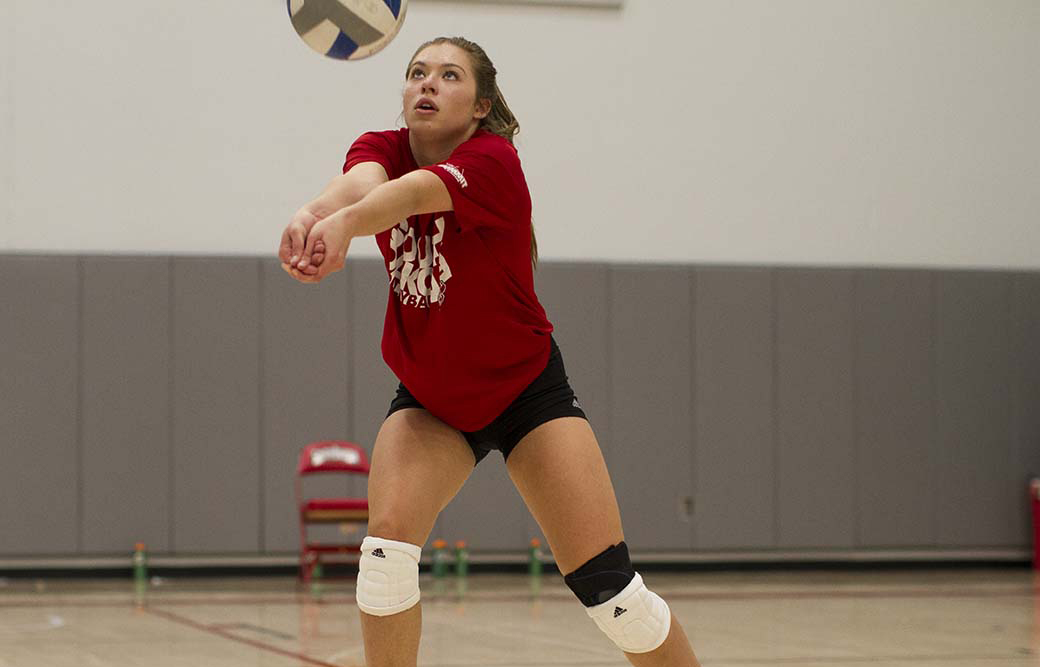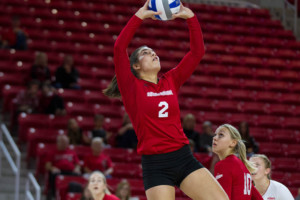
Student-athletes benefitting from coming a semester early
High school student-athletes that are committed to athletic programs are increasingly graduating a semester early in order to get a head start on practicing with their college teams. Two such athletes are on USD’s volleyball team.
Freshman Makenzie Hesse, an outside hitter, started classes at the beginning of the spring semester.
Hesse said she committed to USD the fall of her junior year, and started thinking about graduating early shortly afterwards. She said she liked USD because of its size, volleyball coaching staff and the close team atmosphere.
“They’re a huge family,” she said. “There’s no drama or anything, which I loved.”
Junior Brittany Jessen, who also graduated high school a semester early in order to come to USD, said she attributes a lot of her success in the spring of 2014 to her supportive teammates.
“Obviously anyone’s freshman year of college you’re still trying to figure out stuff out and things are new, but I felt like just having the team was definitely a huge, huge help,” she said.
A large part of why Jessen decided to come play early was because the team’s only setter at the time was about to graduate, she said.

“So that would’ve worked for regular season play, but that would have been really overwhelming to be the starting setter and not know any plays or just coming to college in general,” she said. “So I decided to graduate early and it was honestly like one of the best decisions I’ve made.”
Leanne Williamson, the team’s head coach, said USD doesn’t require student-athletes to come early because its staff believes that students’ senior years are “really important.”
“For us, we just don’t think that requiring them to come in early is in their best interest,” she said. “I think it has to be something that they fully believe in, otherwise I think it’s hard to commit to. But it’s definitely a positive when they do want to do it.”
While starting college at any time is often an adjustment, Jessen said her first semester went really well because she thought about the decision a lot before she got to campus and was prepared for its challenges.
“I think that I really embraced the opportunity and I was very happy with my decision,” she said.
Working with the coaches for a semester and getting comfortable with the team are two of the biggest advantages of coming early, Williamson said.
This is especially true in volleyball because there’s an emphasis on skills training for specific positions during the spring, she said.
“We’re maybe breaking down how they play defense, how they move to ball in serve receive, what their arm looks like when they’re hitting,” Williamson said. “You can make some of those adjustments in the fall, but the majority of the fall is based on getting the team ready as a whole to play and win games.”
A supportive team
Coming a semester early is often beneficial in more areas than just athletics, Hesse and Jessen said.
Hesse, a nursing major, is hoping the early start will allow her to take lighter class loads later on.
“Getting a few core classes out of the way would really help me in the future when I have to do clinicals and stuff,” she said.
Williamson said it can be challenging for freshmen to be away from their hometowns and high school classmates, especially if they’re the only freshman joining the team at the time.
“You have to be comfortable with putting yourself out there,” she said.
Hesse said she’s pretty well adjusted to life on campus.
“The first week was kind of a struggle, but I mean, it’s the first week of college. So it’s always going to be a struggle no matter when I came,” she said. “But my team’s been really supportive in helping me out through all of it.”
Team culture is something that’s very important to Williamson. She said it’s critical to create a supportive family atmosphere while also staying competitive and having similar goals.
Creating the right team culture starts with recruiting, she added.
“What type of players are we recruiting? It’s not just players, it’s people. It’s who they are as a person,” Williamson said. “You know, how they interact with friends and family, how they deal with setbacks, how they deal with failures. And all of those things really go into what we have now.”
Jessen said she was “blessed” that the team welcomed and helped her during her first semester.
“I really think that shows on the court, how we work so well together, and happy for each other’s successes and pick each other up during failures, it’s just a really, really good team atmosphere,” she said. “We all work really hard and know what we to accomplish and I just think being on the same page helps a lot.”
Hesse said her teammates have been a big help in adjusting to being at USD.
“I love all of them already,” she said.

